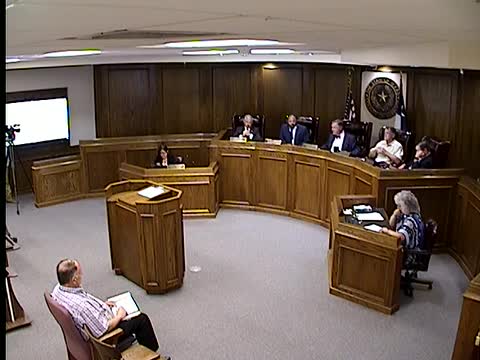Commissioners Vote 4-1 to Approve 2% Salary Increase for Elected Officials
July 28, 2025 | Lubbock County, Texas
This article was created by AI summarizing key points discussed. AI makes mistakes, so for full details and context, please refer to the video of the full meeting. Please report any errors so we can fix them. Report an error »

Tensions flared during the Lubbock County Commissioners' Court meeting as discussions centered on proposed salary increases for county officials. The court faced criticism over what some members described as a "backhanded" approach to raising salaries, with concerns that it would impose a permanent financial burden on taxpayers.
Commissioner Shaw voiced strong objections, arguing that the proposed salary adjustments were not transparent and would unfairly increase the county's budget. "You are backhandedly raising the salaries as a permanent increase on the taxpayers," he stated, highlighting the contentious nature of the discussions.
Despite the pushback, a motion was made to approve a 2% salary increase for elected county and precinct officers for the upcoming fiscal year. The motion passed with a vote of 4 to 1, with Commissioner Dolby dissenting. The court also considered an amendment to raise the sheriff's salary to $150,000 to align it with the rest of his department, but this amendment failed due to a lack of support.
In addition to salary discussions, the court approved the sale of two Chevy Tahoes to Crosby County and discussed the transfer of surplus property within Lubbock County departments. The meeting concluded with plans to accept a grant from the Texas Veterans Commission, signaling ongoing efforts to support local veterans.
The outcome of the salary discussions and the approval of surplus sales reflect the court's balancing act between fiscal responsibility and fair compensation for county officials. As the county prepares for the next fiscal year, these decisions will undoubtedly impact both the budget and public perception of the court's governance.
Commissioner Shaw voiced strong objections, arguing that the proposed salary adjustments were not transparent and would unfairly increase the county's budget. "You are backhandedly raising the salaries as a permanent increase on the taxpayers," he stated, highlighting the contentious nature of the discussions.
Despite the pushback, a motion was made to approve a 2% salary increase for elected county and precinct officers for the upcoming fiscal year. The motion passed with a vote of 4 to 1, with Commissioner Dolby dissenting. The court also considered an amendment to raise the sheriff's salary to $150,000 to align it with the rest of his department, but this amendment failed due to a lack of support.
In addition to salary discussions, the court approved the sale of two Chevy Tahoes to Crosby County and discussed the transfer of surplus property within Lubbock County departments. The meeting concluded with plans to accept a grant from the Texas Veterans Commission, signaling ongoing efforts to support local veterans.
The outcome of the salary discussions and the approval of surplus sales reflect the court's balancing act between fiscal responsibility and fair compensation for county officials. As the county prepares for the next fiscal year, these decisions will undoubtedly impact both the budget and public perception of the court's governance.
View full meeting
This article is based on a recent meeting—watch the full video and explore the complete transcript for deeper insights into the discussion.
View full meeting
